From the Midwest to the Far East:
The Oberlin Orchestra Tours Asia
Saturday, December 31, 2010 • New Year’s Eve, Beijing, China
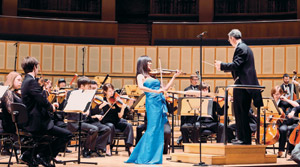
Violinist Lee-Chin Siow ’95 performs with the Oberlin Orchestra led by Conductor Timothy Weiss at the Esplanade Concert Hall in Singapore.
(Photo by Keppel Corporation)
The stage door opened, and Timothy Weiss, conductor of the Oberlin Orchestra, stepped onto the brightly lit stage of the Beijing Concert Hall, ready to conduct. Seconds later, the bold opening brass chords of Shostakovich’s Festive Overture rang out; the Oberlin Orchestra’s 2010 New Year’s Eve concert had begun. A sold-out audience—including Beijing government officials and Dean of the Conservatory David H. Stull—delighted in the program, highlights of which included Ravel’s Tzigane with violinist Lee-Chin Siow ’95 and “Symphonic Dances” from West Side Story. The air of excitement carried on well past the final notes of the encores. The orchestra members then braved the bitter cold wind blowing through the streets of Beijing to celebrate New Year’s Eve.
The Tour Begins
Nine days earlier, at 3:30 a.m. in the conservatory lounge, the 80 members of the orchestra tour party, including student musicians and staff, boarded buses for the Cleveland airport. Over the next 15 days, they would play six concerts in five cities in China, concluding the tour with a brilliant performance in Singapore’s celebrated Esplanade Concert Hall.
We had learned much since the orchestra’s earlier tour of China in 2005-06. The success of that tour and the conservatory’s subsequent work in China had afforded Oberlin a significantly enhanced reputation in that country. For this tour, we had a better understanding of Chinese culture, a more bolstered staff, and the benefit of a leading concert hall as our presenter. As a result, this tour promised to be smoother, but more importantly, to provide our students with an excellent musical and educational experience.
Planning for the tour began almost a year earlier, under the direction of Gloria S. Kim ’01, associate dean for artistic programming and operations. Talks began in early 2010 with the Beijing Concert Hall Corporation (BCHC), a major presenter at the center of a large network of cooperating concert halls, which proposed to present the Oberlin Orchestra in prominent venues throughout China. As in 2005-06, the tour was sponsored at a level unprecedented among U.S. conservatories.
Conductor Timothy Weiss began to craft a program that would balance Oberlin’s need for a challenging and musically rewarding repertoire with Chinese concertgoers’ expectations of a New Year’s concert. In spring 2010, auditions were held for the tour orchestra, and the effort to secure official papers and visas began. The fall semester was a steadily increasing flurry of activity as we prepared for our late-December departure.
Finalizing the tour itinerary, the countless details of which are crucial to the success of such a complex operation, proved to be challenging. Working in present-day China, with its rapid economic and social change, is both exciting and demanding, yet requires tremendous flexibility in planning. The Chinese explain this as “Jihua bu gan gaibian” (plans cannot keep up with change). Our experience had taught us to expect this, however, and the orchestra adapted capably.
We arrived at the Oriental Arts Center, a magnificent modern building in the heart of Shanghai, on Christmas day, excited to perform the first concert of our tour. Oberlin alumna Beatrice Camp ’72, the U.S. consul general in Shanghai, personally addressed the audience before the concert, which was attended by the presidents and faculty of major conservatories in China. The tour was off to a terrific start.
The students took advantage of several free days following the concert to explore Shanghai and beyond, navigating public transit and a reserved cabbie corps to visit markets, museums, and temples. Hornist Valerie Sly ’12 was proud that her group had mastered the complicated subway system, until they tried to return to the hotel. Yet although the group spent more than four hours in transit, they maintained a great attitude: “We got to see the toilet district, the plumbing district, the fish district, and the chicken district.”
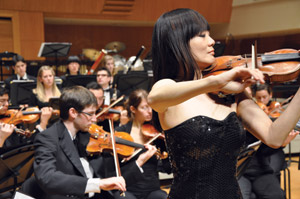
Soloist Lee-Chin Siow ’95
Arriving in Hangzhou on December 29, we were treated to some truly authentic Chinese food, including chickens with their heads and feet still attached and shrimp that was to be eaten shells and all. We spent a cold but enjoyable afternoon at Xihu, a sprawling lake and park that is featured on the back of the one-yuan bill.
Eager to set up the stage in time for the orchestra’s arrival, the advance team arrived at the Hangzhou Theater, a massive complex containing several venues. We were slated to perform in the largest of these; designed for opera, it boasted a backstage the size of an airplane hangar.
January 2 will be remembered by the orchestra as the longest day of the tour. It began and ended well, and along the way we became an extraordinary team. En route to Wuhan, following two sold-out performances in Beijing’s acoustically beautiful concert hall, our plane turned around as news reached us that the city’s airport had closed because of an unusually severe snowstorm. Frustrated, tired, and back on the ground in Beijing, we received a series of conflicting orders. About an hour later, however, our hosts managed to pull some strings, and half of our party was directed to get their bags. At the same time, the other half of the orchestra was directed to head to the gate. That group took off at a run—without their luggage. Meanwhile, the first group returned to find themselves now in charge of all the bags and equipment, but they quickly adopted a “one-for-all” spirit, organizing, checking, and retagging bags.
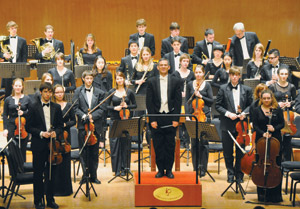
Maestro Weiss and the Oberlin Orchestra receive a standing ovation.
(Photo by Daniel Schloss '07)
Landing in Wuhan at 7:15 p.m., that same group formed a human chain to move all 109 bags in 10 minutes. While these students sped to the hall, the students from the first flight crafted a plan for managing the 7:30 p.m. concert start. In true Oberlin spirit, they performed 30 minutes of impromptu chamber music in jeans and t-shirts, eliciting cheers from the capacity crowd. By intermission, the second half of the orchestra had arrived and quickly changed into formalwear. The full orchestra went on to play a superb concert to a grateful audience, which included Vice Governor of Hubei Province and Wuhan City Gu Shengzu and the U.S. Consul in Wuhan Diane Sovereign. Sovereign thanked the orchestra for its impressive feat, and Stull praised the orchestra for its remarkable level of professionalism.
The sprawling metropolis of Chongqing, where we arrived the next day, held its own surprises. We left our unheated hotel rooms to arrive at yet another massive concert hall, this one even colder than our hotel. Weiss tried valiantly to rehearse the strings before finally conceding to the cold conditions. The woodwind instruments would be damaged if played, and tuning the orchestra would prove nearly impossible in a room hovering below 62 degrees. Thankfully, the stage finally rose to a minimally acceptable temperature and the show went on.
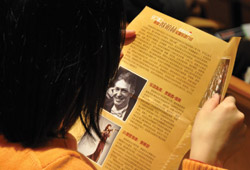
The orchestra's performance program was translated into Chinese by Kai Fu, the conservatory's coordinator
for international outreach.
(Photo by Daniel Schloss '07)
With our long-awaited trip to Singapore came a welcome relief from the cold weather. The contrast between wintry Chongqing and the tropical island of Singapore could not have been greater. The Oberlin Orchestra completed the final leg of its Asia tour on January 6 with a sold-out concert at the extraordinary Esplanade Concert Hall. As Singapore’s most celebrated performance venue, the Esplanade boasts superb acoustics, one of only five such halls in the world with similar state-of-the art features. The concert was attended by many of the nation’s top dignitaries, including American Ambassador to Singapore David I. Adelman, Deputy Prime Minister and Minister of Defense Teo Chee Hean, Minister of Manpower State for Trade and Industry Lee Yi Shyan, and Deputy Chief of Mission to Singapore Louis Mazel.
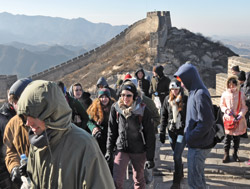
Members of the Oberlin Orchestra at the Great Wall of China.
(Photo by Daniel Schloss '07)
The orchestra’s performance was a great success. The musicians received several ovations during the concert and played three encores, culminating in a final standing ovation. The atmosphere was one of celebration and achievement. The Strait Times, Singapore’s primary news source, raved about the concert in an online review posted the next day. “Bold and confident” characterized the brass fanfares in the Shostakovich, and high praise was bestowed upon first clarinetist Eric Anderson ’12, calling his solos “excellent.” The concert also marked the homecoming of soloist Siow; the Strait Times lauded Siow’s “full-bodied voluminous tone that resonated richly through the hall.”
For the musicians and staff of the Oberlin Orchestra, the Asia tour was far more than a series of concerts spanning two weeks. The musicians had, as Stull noted, “gained invaluable professional training for the world beyond the halls of academe, and brought music from America to celebrate the new year with friends in Asia.” The experience was indeed transformational.
The full scope of the tour and its impact on the students in the orchestra are brought to life in a video series by Daniel Schloss ’07, associate director of media production. You can see it all at: oberlinasiatour.tumblr.com.
Oberlin Orchestra
Timothy Weiss, Conductor
Lee-Chin Siow ’95, Violin
Festive Overture, Op. 96: Dmitri Shostakovich
Yao Zu Suite: Tieshan Liu and Yuan Mao
The Lark Ascending: Ralph Vaughan Williams
Tzigane: Maurice Ravel
Lee-Chin Siow, violin
Tritsch-Tratsch Polka: Johann Strauss
Intermission
Great Song of the Flag: Qiming Lu
“Symphony Dances” from West Side Story:
Leonard Bernstein
Cuban Overture: George Gershwin
Encores, to be chosen from:
March from Raiders of the Lost Ark by John Williams
Estrellita (with Lee-Chin Siow) by Manuel Ponce
Radetzky March, Op. 228 by Johann Strauss
Timothy Weiss, Conductor
“The Oberlin Orchestra typically rehearses intensively for a single performance, which allows us to cover a large range of repertory. However, the opportunity to play repeat performances of one program on tour has huge benefits for students. The group fully saturates the material, they tighten up as an ensemble, the interpretation becomes sharper and stronger, and each performance is better than the previous. The students also learn how to perform at a high level despite great fatigue or even illness brought on by the rigors of a heavy travel schedule. That is an experience you can’t have when you play a program once and your commute is a five-minute walk from South Hall to Finney Chapel.
I can’t imagine a better group of students with whom to have shared the experience. The students on every level, musically and personally, were fantastic. It was a pleasure to travel and perform with them and to share such a rich musical and cultural experience. I can’t wait to do it again.”
Ian Copeland ’11, Bass Clarinet
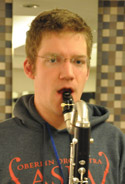
“Hailing taxis in China can be tricky. There are, as you may have heard, lots of people there, and given the choice—if I were a cab driver—I’d be less inclined to opt for tousled tourists than for a safe, Mandarin-speaking local. Thus was our dilemma on a sub-freezing night in Beijing: after nearly an hour of manic gesticulations and no small amount of perilous jaywalking, our group of seven staff and students remained cabless.
When at last we found an inactive cabby taking a cigarette break in an out-of-the-way parking lot, we thought we were in business. But seemingly simple matters—as we learned again and again on this tour—are not, even by Oberlin standards, straightforward. In the end, it was the very legitimate-looking cab driver’s considerably less-legitimate-looking friend into whose even less-legitimate-looking car we exhaustedly piled.
After putting in a call (presumably to his wife) to get Google Map directions to our hotel, our newly tapped and fearless leader drove on, through, and around any paved surface marginally available to him, including bus lanes, bike lanes, sidewalks, and not-so-one-way streets. Let’s just say Chinese cyclist insurance premiums must be murder. We arrived punctually and in one piece, negotiated our fare in Mando-American sign language, and headed upstairs to dinner.”
Rebecca Landell ’11, Cellist
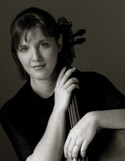
“I was struck by the power of communication—the kind that allows people to see out of each other’s eyes; the kind that transports people into new perspectives.
I don’t speak Chinese, so I couldn’t communicate well in China. When I got lost, I got very lost, and when I ordered dinner…well…I hoped for the best. But the most difficult obstacle to overcome was the lack of facial communication. In China, people don’t show much public expression. At one point I was in a taxi that was scraped by another car. The drivers didn’t blink. No finger, no yells.
The concerts in China were similarly strange. Early on in the performances, the audiences seemed reserved and hesitant. The orchestra would play a fun, fast, piece, but we felt like we were playing into a black hole. But after the intermissions, something would change. The audiences would pay more attention, there were audible reactions to the music, and the energy level increased. By the end of the second half, it was a different audience, and I knew why. They had heard and understood. They had glimpsed a different perspective, and in that space there were no language barriers or differences in cultural expectations. There was communication.”
Daniel Schloss ’07,
Videographer
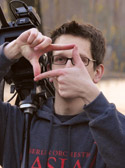
“I saw the Oberlin Orchestra’s tour of Asia through a unique lens. Several lenses actually—I brought my large professional video camera for taping concerts, a smaller high-definition camcorder to capture on-the-go, behind-the-scenes footage, and a digital SLR camera for taking pictures. As the official videographer and photographer for the tour, I wanted to capture as much as possible.
It’s not often that I take away footage so rich, nor have such an amazing soundtrack to edit. Each concert hall was unique, and every outdoor location was stunning, from the cities’ ancient-to-strikingly modern architecture, the lake in Hangzhou, or the Great Wall. A few times I looked down at my camcorder’s LCD screen and actually did a double take, not believing what I was seeing. (The Intercontinental Hotel in Hangzhou looks exactly like the Death Star, no kidding!) On the buses and airplanes, I had 80-plus faces to capture, often gleeful, sometimes dead tired. And not only was the orchestra beautiful to listen to, but their instruments and the motion of playing can be thrilling to see up close.
Viewing events through a lens can be distancing; in the past I’ve felt separated from the moment when I’m working. But on this tour the cameras brought me closer. I was given unique access to the music, to students and staff, and to so many new places—none of which could have transpired in another context.
Search www.youtube.com for “Oberlin Asia tour” or visit oberlinasiatour.tumblr.com. to see some sights and sounds from the tour.”
Dr. Joseph Markoff ’65,
Oberlin College Trustee
The conservatory extends a warm thank you to Joe Markoff, who served as the tour physician and a member of the orchestra’s trumpet section, reprising his role from the 2005-06 China tour.
A conservatory student when he arrived at Oberlin in 1961, Markoff soon realized that science was a stronger calling and switched to the College of Arts and Sciences. He earned a PhD in physiological psychology at Syracuse University while at the same time pursuing a second career as a trumpeter with the Syracuse Symphony Orchestra. Markoff founded Philadelphia Eye Associates in 1978, remaining there for 32 years before accepting the position of global director for scientific affairs in ophthalmology at Merck, Inc., in 2010. Alongside his medical practice, Markoff has performed with a variety of musical ensembles, including the Philadelphia Orchestra, the Mozart Orchestra of Philadelphia, and the New Jersey Chamber Music Society.
The Oberlin Conservatory of Music thanks the following for their generous support:
Sponsors and Partners
Beijing Concert Hall Corporation
Keppel Corporation, Ltd.
Frasers Hospitality Pte Ltd.
Raffles Institution
Kwee Liong Seen
Yong Siew Toh Conservatory of Music
James Kalyn served as program director of the Oberlin conservatory’s relationships in China. He also taught secondary saxophone in the conservatory.
